They might not be raindrops on roses or whiskers on kittens, but that doesn’t mean that we love them any less. Welcome back to My Favorite Things, the weekly column where we grab someone in speculative circles to gab about the greatest in geek. This week, we sit down with Catherine Wallace Hope, whose debut, Once Again, comes out October 6th from Alcove Press!
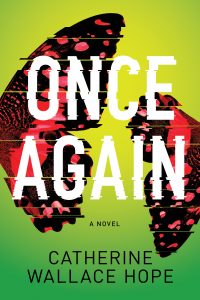
What does Catherine love when she’s not writing about saving someone previously lost? Spoiler alert: a poetic way of looking at the quantum world, a tale of time-travel our book clubbers are quite familiar with, the truth behind unreliable narrators, literal and literary comfort food, a time-travel thriller featuring a heroine who doesn’t let disability get in her way, and the final episode of the longest-running sci-fi show that hasn’t even aired yet. Intrigued? Read on to learn more!
To my slightly synesthetic mind, the word favorite appears with an red-orange-plum color spectrum and a bouncy, vibrant Italian-street-festival style of movement within a sentence. Favorite. The word arrived in the English language sometime in the 1500s from its Italian ancestor, favorito, and has remained almost completely unchanged since then. Unlike words that have morphed into their opposites (e.g., egregious, which used to mean “quite good”), the meaning of favorite has settled into a stable range. It can be bawdy and raucous and acquire an added vowel, as in the British spelling for the film The Favourite, or it can be delicate and wistful as in Taylor Swift’s song “Cardigan”: “And when I felt like I was an old cardigan under someone’s bed, you put me on and said I was your favorite.” With all of that in mind, here are a few of my favorite things. (Oh, how could anyone not adore whiskers on kittens?!?!)
My favorite astrophysicist is Carlo Rovelli. Though he is, in fact, neither speculative nor fictional, he has become nearly mythical to me. I discovered his work as I was doing research 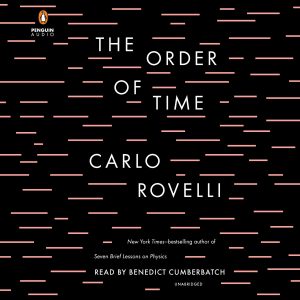 for my novel Once Again. I had learned fascinating things from other physicists. From Kip Thorne, I learned how to see time as gravity; and from Sean Carroll, I gathered useful information about the Many Worlds view. But Rovelli swept me into the beautiful, lyrical terrain of loop quantum gravity. It’s a thrilling and picturesque place, and Rovelli took me there with all the poetry and exuberant fire of his Italian character. I learned from him fascinating theories of what happens at the innermost point of a black hole when it whitens into a mirror. I worked hard to understand his views of the interknitted quantum world. In his book The Order of Time, he guided me through the bewildering deconstruction of what I thought was my common-sense view of time. In the final chapter, “The Sister of Sleep,” he elevated the discussion to reveal his cosmology, his ultimate view of life as the song of our emotions and time as our measure of meaning.
for my novel Once Again. I had learned fascinating things from other physicists. From Kip Thorne, I learned how to see time as gravity; and from Sean Carroll, I gathered useful information about the Many Worlds view. But Rovelli swept me into the beautiful, lyrical terrain of loop quantum gravity. It’s a thrilling and picturesque place, and Rovelli took me there with all the poetry and exuberant fire of his Italian character. I learned from him fascinating theories of what happens at the innermost point of a black hole when it whitens into a mirror. I worked hard to understand his views of the interknitted quantum world. In his book The Order of Time, he guided me through the bewildering deconstruction of what I thought was my common-sense view of time. In the final chapter, “The Sister of Sleep,” he elevated the discussion to reveal his cosmology, his ultimate view of life as the song of our emotions and time as our measure of meaning.
The audiobook, which I highly recommend, is narrated by Benedict Cumberbatch, who is also a huge fan of Rovelli. I found that the actor brought a lucidity to the prose that I couldn’t create on my own. I’m grateful for the deep, resonant quality of his voice that reassured me as I struggled for understanding and the calm British clarity that made the difficult patches seem like pleasurable time spent in warm conversation, an inspiring challenge to understand who we are within the complicated notion of time.
My favorite speculative novella of recent years is This Is How You Lose the Time War coauthored by Hugo, Nebula, and BSFA award-winners Amal El-Mohtar and Max Gladstone. It’s the story of two rivals, spies who travel “upbraid” and “downbraid” on threads of time, across fields of wars that recur over millennia, each fighting to guarantee the future in which her side has won and therefore to ensure her own existence in that future. What starts as a taunt from one assassin to another soon evolves into an epistolary exchange of respect and 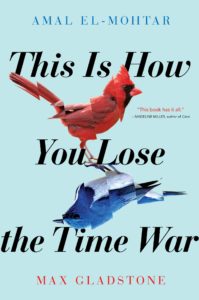 then attachment and then love and sacrifice. The language of this love story is so sumptuous and the imagery so intriguing that I recommend reading as slowly as possible. The plot might make you want to rush forward, but lingering to extend the moments is deeply rewarding. It will make it all the more satisfying when the twist at the end reflects back to the very first chapter and becomes clear.
then attachment and then love and sacrifice. The language of this love story is so sumptuous and the imagery so intriguing that I recommend reading as slowly as possible. The plot might make you want to rush forward, but lingering to extend the moments is deeply rewarding. It will make it all the more satisfying when the twist at the end reflects back to the very first chapter and becomes clear.
I’m fascinated by the way these two authors worked together to create this metafiction of a success story. They began their friendship as acquaintances in the very public theater of social media, and they knew each other’s work and admired each other. When the exhibit-like nature of the internet no longer seemed to fit, they went old style and started communicating in letters, with the quality of thought you’d bring to a “really intense conversation” with a friend. Their friendship deepened, and they knew they should work on a project together, so they started writing letters to each other about the story of a relationship of letters. What’s even more astounding is that they wrote this amazing, award-winning story in just six weeks. Some of the work was done in the setting of a writers’ retreat, and those weeks were spread out over a year; but still, six weeks from first draft to final, finished piece is hard to comprehend.
If you haven’t read it, I encourage you to get a copy now. It’s a fantastic read.
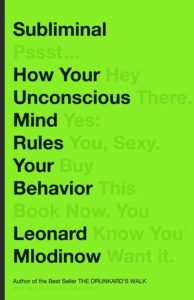 My favorite revelation during research came as I read Subliminal by Leonard Mlodinow. Authors talk in great volumes among themselves about unreliable narrators — how to create them, what their function is, how they operate, and so on. But when I read Subliminal: How Your Unconscious Mind Rules Your Behavior, I realized that all narrators — humanity as a whole — are unreliable, both in fiction and in life. Mlodinow uses light self-mockery to ease the tension in his assertions about how completely skewed human perception is. In study after study he cites, the science shows how our brains reformat incoming information in ways that distort reality. Sometimes, the shift is so subtle it doesn’t matter much, but sometimes the distortion can have profound consequences. Here are some examples. In one study, consumers were asked to select one pair of silk stockings from among four pairs. They were instructed to choose what they thought was the highest-quality pair. One pair was selected much more often than the others, and test subjects described them as having superior texture, sheen, weave, feel, and weight. What they didn’t know and didn’t perceive was that all of the stockings were identical except that the oftenest-selected pair had had a light scent applied to them. Only a few subjects noticed the scent.
My favorite revelation during research came as I read Subliminal by Leonard Mlodinow. Authors talk in great volumes among themselves about unreliable narrators — how to create them, what their function is, how they operate, and so on. But when I read Subliminal: How Your Unconscious Mind Rules Your Behavior, I realized that all narrators — humanity as a whole — are unreliable, both in fiction and in life. Mlodinow uses light self-mockery to ease the tension in his assertions about how completely skewed human perception is. In study after study he cites, the science shows how our brains reformat incoming information in ways that distort reality. Sometimes, the shift is so subtle it doesn’t matter much, but sometimes the distortion can have profound consequences. Here are some examples. In one study, consumers were asked to select one pair of silk stockings from among four pairs. They were instructed to choose what they thought was the highest-quality pair. One pair was selected much more often than the others, and test subjects described them as having superior texture, sheen, weave, feel, and weight. What they didn’t know and didn’t perceive was that all of the stockings were identical except that the oftenest-selected pair had had a light scent applied to them. Only a few subjects noticed the scent.
Except for the likelihood of being hornswoggled, the ramifications for that kind of misperception are perhaps trivial. However, there are similar mechanisms in the brain whose effects are more significant.
Mlodinow shows how, without our knowing it, our brains will automatically and unconsciously sort a person into a category based on only a few salient features, and then we base our assessment of that person on the category rather than the person themselves. And this happens outside of our awareness. It’s a feature of the brain that was a valuable survival mechanism when we evolved back in prehistory, but now, because we don’t know it’s happening, it distorts our judgment. Even memory, our most cherished scaffold of identity, is often inaccurate. We are all unreliable narrators.
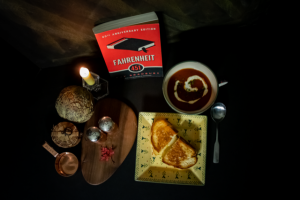
My favorite dinner of a favorite author is a grilled cheese sandwich and tomato soup. Those are the favorite foods of Fahrenheit 451 author Ray Bradbury. When I learned this fact about Bradbury, I felt kinship with him because those foods were favorite comfort foods of mine when I was a child. They still are! Especially now, in this time when we need all the simple comforts we can find. And besides, I’d had a longstanding argument with Ray in my mind (which happens a lot when you’re a writer) about advice he once gave to young writers. He said never to keep a notebook, that if the idea was any good, you’d remember it. Stephen King doubles down on that advice. To both of them, I say No.
Because memory is unreliable. (See above.) In the workshops I teach, I always encourage writers to keep a notebook and to write everything down. There are things that flit across the bright screen of your mind for a moment, and then they’re gone, into the darkness. And some of them never return! So I disagreed on that small point with an author I admire so much.
This year, on August 22nd, we celebrated Bradbury’s centennial. Over the course of his long life, he wrote dozens of novels, hundreds of short stories, as well as numerous plays, poems, collections, and screenplays that have helped shape the mind of the modern world. He began writing at eleven years old, on butcher paper, the only paper he could come by during The Great Depression. He wrote every day of his life.
In Bradbury’s honor, my husband and I had grilled cheese sandwiches and tomato soup to celebrate his centennial.
I’d love to know what your favorite comfort food is.
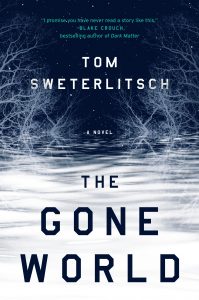 My most recent favorite female hero is future NCIS investigator Shannon Moss from Tom Sweterlitsch’s amazing time-travel novel, The Gone World. In this complex story, Moss is an agent capable of Deep-Space and Deep-Time travel who must investigate the gruesome murders of two members of a Naval officer’s family and the disappearance of a third. She travels forward in the chronology in an effort to uncover information that will surface only with the passage of time. But a more apocalyptic consequence reveals itself. Travel between times has introduced an extinction-level threat to the future of the world — the Terminus. And with each iteration, its date of arrival draws closer.
My most recent favorite female hero is future NCIS investigator Shannon Moss from Tom Sweterlitsch’s amazing time-travel novel, The Gone World. In this complex story, Moss is an agent capable of Deep-Space and Deep-Time travel who must investigate the gruesome murders of two members of a Naval officer’s family and the disappearance of a third. She travels forward in the chronology in an effort to uncover information that will surface only with the passage of time. But a more apocalyptic consequence reveals itself. Travel between times has introduced an extinction-level threat to the future of the world — the Terminus. And with each iteration, its date of arrival draws closer.
As Moss meticulously investigates the original crime, always hoping to find the missing girl alive, she discovers larger anomalies associated with it, arriving in different futures and pasts, facing different versions of people she has loved, or served, or fought against.
What impresses me about Moss is the indomitable quality of her determination. Though she is an amputee, she is fearless. In her pursuit of the truth, she discovers a strategy described as a butterfly in a bell jar. Once future agents know that she is from terra firma, a the locus of established time’s set point, they know their time can be obliterated when she returns home, so their continued existence depends on imprisoning her in their world. When the risk to her is greatest, she refuses to give up. She learns that when other people from a future timeline travel through Deep Time and Deep Space to inhabit terra firma, they exist only as echoes. And when, in the end, she discovers the truth about who she is and the role she will play in the arrival of the Terminus, she takes a step few people would have the courage to take.
 My favorite long-overdue finale of a TV show will be the last episode of Supernatural. This years-long saga of two monster-killing brothers started a very long time ago. Sam and Dean Winchester (played by Jared Padalecki and Jensen Ackles, respectively) are sons of a mother killed in an unnatural fire and a father dedicated to finding the culprit.
My favorite long-overdue finale of a TV show will be the last episode of Supernatural. This years-long saga of two monster-killing brothers started a very long time ago. Sam and Dean Winchester (played by Jared Padalecki and Jensen Ackles, respectively) are sons of a mother killed in an unnatural fire and a father dedicated to finding the culprit.
The boys started that first season in a desperate search for their father, newly gone missing. In their pursuit, they fought all manner of evil creatures until they uncovered the truth of their tragic past and embarked on the journey to avenge their mother’s murder. Several great seasons ensued. A supporting cast featuring appealing actors such as Jeffrey Dean Morgan, Jim Beaver, Kim Rhodes, Mark Pellegrino, Sterling K. Brown, Misha Collins, Ruth Connell, Mitch Pileggi, Mark Sheppard, and multitudes more helped the leads keep this show fun and compelling for a long time.
When the show started in 2005, Padalecki was 23 and fresh off a five-season stint on Gilmore Girls and Ackles was 27 and had most recently worked on Smallville. As the seasons went on, the two battled innumerable preternatural entities, endured each other’s several deaths, descents into hell, and resurrections. How could anyone not love these guys? Unflinchingly courageous (except for one hilarious episode when Dean develops an illness of irrational fear of almost everything), resolute, loyal (except for that nasty patch of soulless Sammy). It’s been a great run. Supernatural is the longest-running American live-action sci-fi series. Despite uneven seasons toward the end, fans have refused to let their heroes go, until now, that is. In 2019, the stars announced that the show had to finally end. After all, Padalecki is now 38 years old and married to co-star Genevieve Cortese Padalecki, and the two have three children. As for Jensen Ackles, he is now 42 and married to Supernatural guest player Danneel Harris Ackles, and together they have three children. They’ve come a long way from those two young hunters. I know it’s like saying goodbye to guys you grew up with. But really, people, this has to end. For all that’s holy, let them go. Show note: The final episodes of the series have been delayed indefinitely due to COVID-19. Unbelievable.
 Award-winner Catherine Wallace Hope grew up in Colorado, the setting for her thriller Once Again. She earned her degree in creative writing at the University of Colorado. She also delved into dance in New York and art and psychology in California. When she returned to Colorado, she became an instructor at the renowned Lighthouse Writers Workshop, offering creativity workshops for writers. Currently, she and her family are living on an island in the Pacific Northwest where they serve at the pleasure of two astonishingly spoiled dogs.
Award-winner Catherine Wallace Hope grew up in Colorado, the setting for her thriller Once Again. She earned her degree in creative writing at the University of Colorado. She also delved into dance in New York and art and psychology in California. When she returned to Colorado, she became an instructor at the renowned Lighthouse Writers Workshop, offering creativity workshops for writers. Currently, she and her family are living on an island in the Pacific Northwest where they serve at the pleasure of two astonishingly spoiled dogs.

Love this. I’ve added a bunch of these to my wishlist, including your book! I would’ve bought it, but it’s too close to my birthday.
I would’ve bought it, but it’s too close to my birthday. 